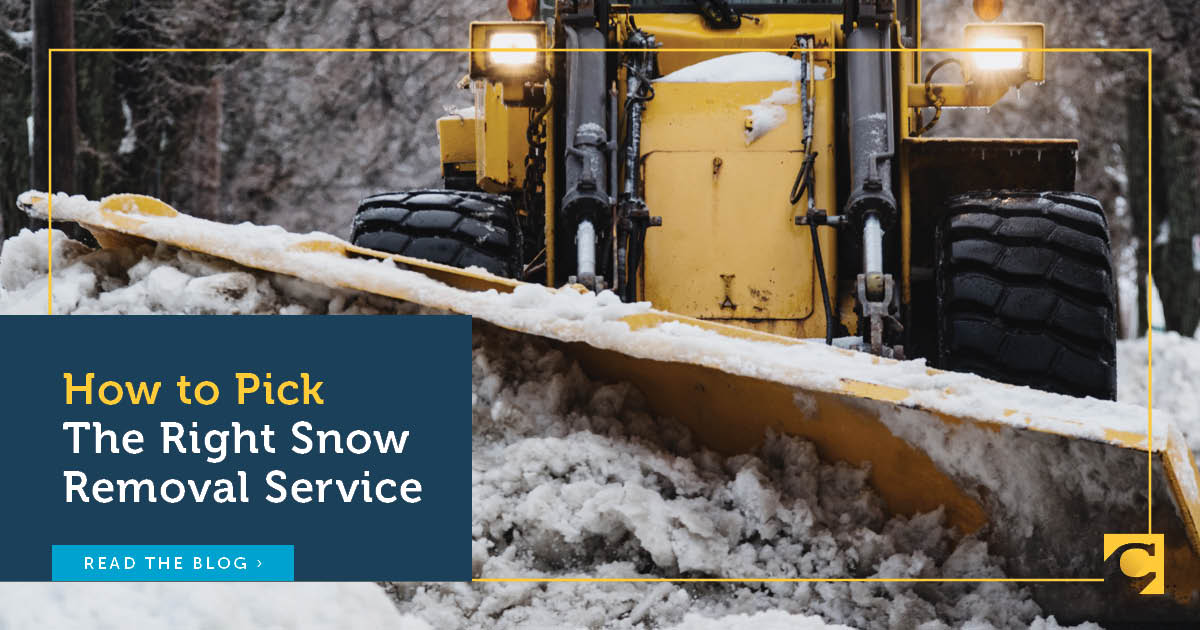How to Pick the Right Snow Removal Service

Choosing the right snow removal service is a crucial step in winter preparation for businesses and homeowners alike. Here are seven expert tips for choosing a reputable and reliable contractor this season.
Step #1: Require an on-site visit or evaluation
Your snow removal contractor should visit the property and take notes about requested services and potential obstacles prior to the first snowfall. By doing so, they can accurately estimate the time and manpower required to service the area.
Step #2: Ask for a schedule
Different properties have varying needs when it comes to snow removal. Where one might need a weekly plowing, another might require bi-weekly or only a clean-up after a fresh snowfall. Knowing when you can expect your contractor to arrive can help you plan alternate snow removal practices for between visits, such as shoveling, salting, etc.
Keep in Mind: Some contractors do snowplow services as a part-time job, which may affect their availability. Be sure to confirm their hours of operation before the winter begins.
Step #3: Check their references
It’s important that you have a well-known, licensed, and bonded professional in charge of your snow removal service.
While some property owners might fall into the trap of choosing less reputable contractors in exchange for a lower price, snow removal (and its potential impact on the safety of yourself and those on your property) is not an area where you should place savings above safety.
A quick Google search should give you an idea of a company’s reputation, but it never hurts to ask for references. A company in good standing should be able to provide these, and any company that is reluctant to do so is likely not as reputable as it should be.
Step #4: Ask to see their certificate of insurance
The company you pick for your snow removal service should be properly insured in case of any accident or damage they cause. Ideally, they should be able to provide a copy of their insurance, which you should keep on file throughout your contract.
Most importantly, this documentation should prove that their Liability and Workers’ Compensation insurance coverage is current.
Step #5: Always get a written contract
A conversation with a snow removal company is only the first step in solidifying your coverage. Always be sure to get a detailed contract written up prior to the start of the season. An effective contract includes sections on:
The scope of the services they will provide (plowing, shoveling, sanding/salting)Your property’s unique needs (such as parking lots, driveways, walkways, roof coverings)The frequency or terms of their visits (i.e. the amount of snow required for them to show up, days of the week they plan to plow, etc.)Their expectations for payment
Did You Know: Most contractors either use a pay-per-plowing or pay-per-season model. If you’re asked to pay all fees upfront, that should be a red flag that the contractor is not reputable, as most contractors will split fees into multiple payments throughout the season.
Read everything before you sign, and make note of any cancellation fees and extra charges that may apply.
Step #6: Remember to evaluate
Most home and business owners make the mistake of setting a snow removal plan and considering their part of the process complete. However, monitoring the contractor’s work throughout the season is important, as well.
Check to ensure they are removing snow and ice after a weather event in a timely manner and per the established contract. If they are not, follow up to address any issues, and adjust future seasonal contracts as needed to prevent further mishaps.
Step #7: Check your insurance policies each winter
Establishing a snow removal plan is vital in ensuring the safety of those who step foot on your property in winter months—but accidents still happen from time to time.
Make sure you’re covered by checking your policy limits and coverage details for your commercial property insurance (for business owners) or your homeowners insurance (for personal property owners) policies before the first snowfall. Knowing you have coverage in case someone gets hurt on your property will give you the peace of mind you need to continue functioning throughout the winter, no matter how much snow falls.
This article was originally published in February 2021. It has since been updated for accuracy.
Like this:
Loading…



